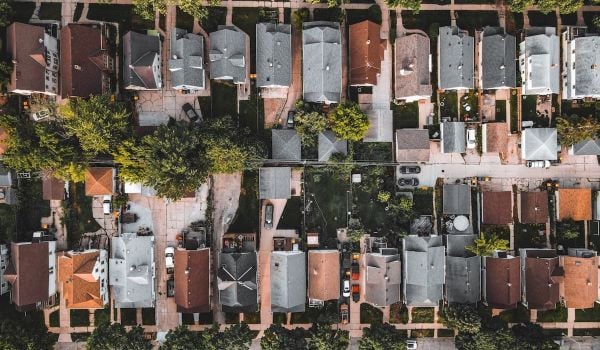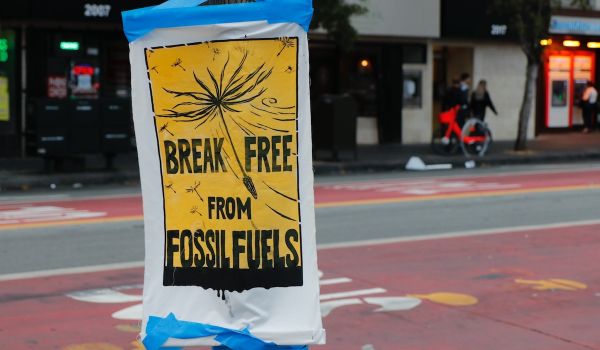Next City has covered some of the best community-driven projects across the country in the past years. We’re revisiting some of them here to see what has happened since 2019.
Clothing Manufacturing Co-Op Purchases New Headquarters
Blue Tin Productions is a worker-owned clothing manufacturing co-op founded by Chicago community organizer Hoda Katebi and three other immigrant women from Syria and Nigeria. Every decision, from which project to take on to what chair to buy for the manufacturing floor, is made collectively by the four. Together, they got production up and running in 2019, partially through a crowdfunding campaign, as Next City previously reported. But they were not looking for charity work. All three of Katebi’s co-op members had years of experience in commercial and industrial sewing back in their home countries.
“We’re a profitable company,” Katebi tells Next City.
As Blue Tin started to take in clients, Katebi began to think about relocating from the current studio to a bigger place, closer to where all the members lived. They found 63rd House, an abandoned building in Chicago Lawn. The co-op purchased the building to transform it into their new headquarters and community space. The pandemic hit shortly after the purchase went through.
The co-owners halted production for a month but quickly regrouped to start producing PPE, donating them to Black- and Brown-led organizations across the city. They dug into their savings in the bank but were able to pay the mortgage through shared capital.
“A lot of our clients did drop. So we [were] working for like, five, six months making no income, but using up all of our own funds to pay our team and buy materials,” says Katebi.
On Oct. 4, Blue Tin announced plans for 63rd House. This11,250-square-foot commercial building will not only be their new headquarters but will also include a small library, a media room, a rooftop garden, a prayer room and spaces for educational events, all open to community members. They’re currently applying for grants and running another crowdfunding campaign for the renovation of the building that will break ground early 2022. Katebi remains optimistic.
“I feel very confident knowing what’s behind us and how we can get to what’s in front of us,” says Katebi.
Methadone Delivery Program Was a Success at the Pandemic’s Peak, But Can it Continue?
About 30,000 people across New York City were receiving methadone treatment for their addiction in March last year when the pandemic hit. Over half of them had to quarantine at home at some point during the pandemic, which means losing access to their daily doses at clinics, according to the city’s Department of Health.
With the federal government easing the limit on take-home methadone, the city launched a methadone delivery program in April 2020 to get the drug to patients in isolation, starting with people living in homeless shelters and isolation hotels. Next City reported on the program in May of last year, when it had made 20 deliveries to 17 people. Allegra Schorr, president of the Coalition of Medication Assisted Treatment Providers, and owner of West Midtown Medical Group, an opioid treatment provider, worked closely with the city’s Department of Health and the Mayor’s Office throughout the process.
“Last year the program had gotten very robust,” says Schorr. “Several thousand deliveries [were made] during the height of COVID.”
Twenty Health Department staff were temporarily reallocated for delivery. However, Schorr explained that as people started to get vaccinated and patients returned to clinics, fewer resources were available to continue the delivery program. By this spring, the city was ready to wrap up the program, but then the Delta variant of COVID-19 started to surge and the program kept running with a much smaller crew to deal with any emergency cases.
“If there were resources, we would have probably kept going, but it simply wasn’t an option,” said Schorr.
Schorr added that she is working with the city Health Department and state’s Office of Addiction Services and Supports on getting more funding for the program and is hopeful that it will be expanded to a statewide program that would provide delivery to remote areas.
Syracuse Eviction Intervention Program Gives Rise to More, But Pandemic Slows Adoption
When tenants are late on rent payments, they don’t usually get much notice until they receive the eviction notice. By that point, there were little lawyers could do in court but delay the inevitable, according to Stephanie Pasquale, former commissioner of the Department of Neighborhood and Business Development for the City of Syracuse.
To address this problem, Syracuse piloted a program in 2019 that aims to stop tenants from having to go to court in the first place. With funding from the Emergency Solution Grants(ESG), a federal program to address homelessness, Syracuse Housing Authority hired two case managers to reach out to tenants who live in public housing within days after they miss a rent payment to offer assistance, like providing resources to one-time financial assistance or payment plans.
The program enjoyed some early success. The number of eviction cases filed in landlord-tenant court by the Syracuse Housing Authority dropped by 75%, and the Housing Authority also saved $116,000 through reducing legal fees and preventing lost rents, as Next City previously reported.
With the success of the pilot, the city, in partnership with Catholic Charities, launched another eviction prevention program at three properties owned by a private firm, Conifer Realty, on April 1, 2020. This program is funded by the Community Development Block Grant. However, due to COVID restrictions, little progress was made.
“At the beginning, property managers stopped going into their offices, and they were working from home. So then they couldn’t get to tenants as easily. And the case managers were not allowed to do in-person visits,” says Sue McMahon, the ESG program administrator in the city’s Department of Neighborhood and Business Development.
Only 13 households were served in the first year of the Conifer program. From March to July this year, only three households were helped. McMahon explained that because Syracuse’s eviction moratorium is in place until Jan. 15 of 2022, tenants are not as worried about possible eviction when they’re late on rent.
Case managers have restarted some outreach work at the three buildings. They have been handing flyers about their services, and trying to have building managers introduce tenants who are late on payments to them. Since July, the case managers were able to work with 34 families, according to McMahon.
“[But] that’s a slower process because people aren’t as panicked,” says McMahon.
McMahon adds that it’s hard to compare this program to the pilot because what they’re doing now is not really early intervention anymore.
“It’s impossible to do early intervention case management because those folks who haven’t paid their rent in over a year. That’s not early intervention,” said McMahon.
The city is now preparing for the surge in need for services after the moratorium expires on Jan. 15 next year.
“We don’t want chaos January 16,” says McMahon, “so we’ve used a lot of our COVID funds, the Emergency Services Grants, and other COVID funding that the city got to invest in eviction prevention and rental assistance.”

Hayley Zhao is the INN/Columbia Journalism School Intern with Next City for fall 2021. Zhao graduated from Columbia Journalism School in May 2021 with a focus on education and environmental reporting.
.(JavaScript must be enabled to view this email address)
















